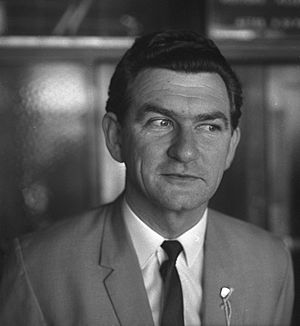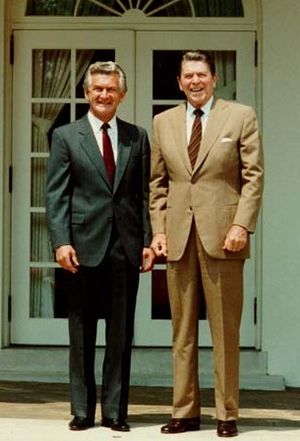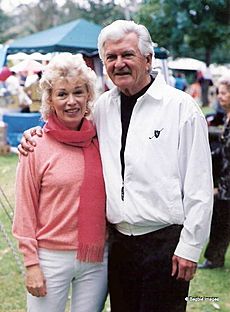Bob Hawke facts for kids
Quick facts for kids
Bob Hawke
AC GCL
|
|
|---|---|
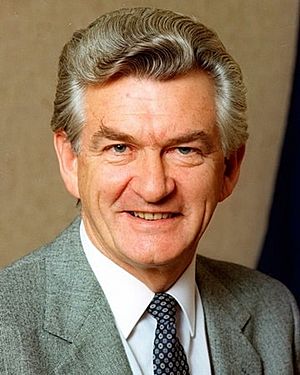
Official portrait, 1983
|
|
| 23rd Prime Minister of Australia | |
| In office 11 March 1983 – 20 December 1991 |
|
| Monarch | Elizabeth II |
| Governor-General | |
| Deputy | |
| Preceded by | Malcolm Fraser |
| Succeeded by | Paul Keating |
| 13th Leader of the Labor Party | |
| In office 8 February 1983 – 19 December 1991 |
|
| Deputy |
|
| Preceded by | Bill Hayden |
| Succeeded by | Paul Keating |
| Leader of the Opposition | |
| In office 8 February 1983 – 11 March 1983 |
|
| Prime Minister | Malcolm Fraser |
| Preceded by | Bill Hayden |
| Succeeded by | Andrew Peacock |
| Member of the Australian Parliament for Wills |
|
| In office 18 October 1980 – 20 February 1992 |
|
| Preceded by | Gordon Bryant |
| Succeeded by | Phil Cleary |
| 7th National President of the Labor Party | |
| In office 7 June 1973 – 2 August 1978 |
|
| Preceded by | Tom Burns |
| Succeeded by | Neil Batt |
| National President of the Australian Council of Trade Unions | |
| In office 10 September 1969 – 1 September 1980 |
|
| Preceded by | Albert Monk |
| Succeeded by | Cliff Dolan |
| Personal details | |
| Born |
Robert James Lee Hawke
9 December 1929 Border Town, South Australia, Australia |
| Died | 16 May 2019 (aged 89) Northbridge, New South Wales, Australia |
| Resting place | Macquarie Park |
| Political party | Labor |
| Spouses |
|
| Children | 4 |
| Parent |
|
| Relatives | Albert Hawke (uncle) |
| Education |
|
| Signature |  |
Robert James Lee "Bob" Hawke (born 9 December 1929 – died 16 May 2019) was the 23rd Prime Minister of Australia. He led the Australian Labor Party and was Prime Minister for over eight years. This makes him the third longest-serving Prime Minister in Australia's history.
Before becoming a politician, Bob Hawke was a powerful union leader. He entered the Australian Parliament in 1980. Just before the 1983 election, he became the leader of the Labor Party. He then won the election, defeating Malcolm Fraser. His government brought in many important changes for Australia.
Bob Hawke was very popular with the public. In 1984, his approval rating reached 75%, which is the highest ever for an Australian Prime Minister. Historians often rank him as one of Australia's best Prime Ministers. He passed away in 2019 at the age of 89.
Contents
Early Life and Family Background
Bob Hawke was born on 9 December 1929 in Bordertown, South Australia. He was the second child of Arthur "Clem" Hawke and Edith Emily "Ellie" Lee. His father, Clem, was a Congregationalist minister, which is a type of Christian church leader. His mother, Ellie, was a schoolteacher.
Bob Hawke's uncle, Albert Hawke, was also a politician. He served as the Labor Premier of Western Australia from 1953 to 1959. Bob's older brother, Neil, sadly died at the age of 17.
When Bob was just fifteen years old, he famously told his friends that he would one day become the Prime Minister of Australia. This showed his early ambition!
At seventeen, Bob had a very serious accident while riding his motorcycle. He was in a critical condition for several days. This near-death experience made him even more determined to use his talents and not waste his life. He joined the Australian Labor Party in 1947 when he was eighteen.
Education and Early Career Path
Bob Hawke went to school at West Leederville State School and Perth Modern School. He then studied at the University of Western Australia. In 1952, he earned two university degrees: a Bachelor of Arts and a Bachelor of Laws. He was also the president of the university's student group that year.
The next year, Bob won a special scholarship called a Rhodes Scholarship. This allowed him to study at University College, Oxford in England. He first started a degree in philosophy, politics, and economics. However, he found it was similar to what he had already studied. So, he switched to a Bachelor of Letters degree. For this, he wrote a detailed paper about how wages were set in Australia. He finished his paper in 1956.
In 1956, Hawke received another scholarship. This time, it was to study law at the Australian National University in Canberra.
Becoming a Political Leader
In 1956, Bob Hawke started working for the Australian Council of Trade Unions (ACTU). The ACTU is a large group that represents workers and their unions in Australia. He began as a research officer. He quickly moved up and became responsible for helping to settle disagreements about wages. In 1969, he was elected President of the ACTU. In this role, he became very well-known across Australia.
After leading the ACTU for ten years, Hawke decided to enter politics. He was elected to the House of Representatives in 1980. He represented the area called Wills in Victoria.
Just three years later, he led the Labor Party to a huge victory in the 1983 Australian federal election. He became Australia's 23rd Prime Minister. He then won three more elections: in 1984, 1987, and 1990. This made him the most successful and longest-serving Labor Prime Minister in history.
During his time as Prime Minister, the Hawke Government introduced many important changes:
- They created Medicare, which is Australia's system for healthcare.
- They started Landcare, a program to help protect the environment.
- They helped create APEC, a group that promotes trade in the Asia-Pacific region.
- They changed how the Australian dollar worked, allowing its value to float freely.
- They made changes to the financial system, making it more open.
- They introduced the Family Assistance Scheme to help families.
- They passed the Sex Discrimination Act to stop unfair treatment in workplaces.
- They officially made "Advance Australia Fair" the country's national anthem.
- They started superannuation pension schemes for all workers, helping them save for retirement.
- They oversaw the Australia Act, which removed the last legal links between the United Kingdom and Australia.
In 1991, his Treasurer, Paul Keating, challenged him for the leadership of the Labor Party. Hawke lost this challenge and then retired from Parliament. After leaving politics, he worked in business and supported many charities until he passed away in 2019.
Personal Life and Family
Bob Hawke married Hazel Masterson in 1956. They had three children: Susan, Stephen, and Roslyn. Their fourth child, Robert Jr, sadly died when he was a baby in 1963. In 1971, Bob Hawke was named Victorian Father of the Year. Bob and Hazel divorced in 1995.
Later, Bob Hawke married writer Blanche d'Alpuget in 1995. They lived together in Northbridge, a suburb of Sydney.
Hawke's Legacy and Recognition
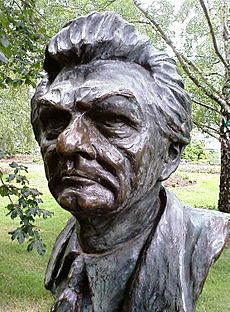
Bob Hawke's life and work have been remembered in many ways:
- A TV movie called Hawke was made about his life in 2010.
- In 2019, the Australian Government announced it would buy and fix up the house where Hawke was born in Bordertown. This house will become tourist accommodation.
- In 2020, the Western Australian Government bought Hawke's childhood home in West Leederville to keep it as a state asset.
- A new scholarship, the Bob Hawke John Monash Scholarship, was created in 2019.
- Bob Hawke College, a high school in Subiaco, Western Australia, opened in 2020 and is named after him.
- In 2020, a new area for voting in federal elections was named the Division of Hawke in his honour. This area is in Victoria, near where Hawke used to be a Member of Parliament.
Honours and Awards
Bob Hawke received many honours and awards throughout his life.
Orders
 1979: He was made a Companion of the Order of Australia (AC). This was for his great work in trade unions and industrial relations.
1979: He was made a Companion of the Order of Australia (AC). This was for his great work in trade unions and industrial relations.
Foreign Honours
 1989: Knight Grand Cordon of the Order of the White Elephant (from Thailand).
1989: Knight Grand Cordon of the Order of the White Elephant (from Thailand). 1999: Freedom of the City of London (from the UK).
1999: Freedom of the City of London (from the UK). 2008: Grand Companion of the Order of Logohu (from Papua New Guinea).
2008: Grand Companion of the Order of Logohu (from Papua New Guinea). 2012: Grand Cordon of the Order of the Rising Sun (from Japan).
2012: Grand Cordon of the Order of the Rising Sun (from Japan).
Awards
 August 1978: He received the Rostrum Award of Merit. This was for his excellent public speaking and his positive impact on society.
August 1978: He received the Rostrum Award of Merit. This was for his excellent public speaking and his positive impact on society. August 2009: He was given a Life Membership of the Australian Labor Party. He was only the third person to receive this special honour.
August 2009: He was given a Life Membership of the Australian Labor Party. He was only the third person to receive this special honour. March 2014: He received a Life Membership from the University of Western Australia Student Guild.
March 2014: He received a Life Membership from the University of Western Australia Student Guild.
Fellowships
Honorary Degrees Bob Hawke received many honorary doctorates from universities around the world, including:
 Nanjing University
Nanjing University University of Oxford
University of Oxford Hebrew University of Jerusalem
Hebrew University of Jerusalem Rikkyo University
Rikkyo University Macquarie University
Macquarie University University of New South Wales
University of New South Wales University of South Australia
University of South Australia University of Western Australia
University of Western Australia University of Sydney
University of Sydney
Images for kids
-
Hawke presenting a relief check to John Bannon, Premier of South Australia following the 1983 Ash Wednesday bushfires
-
Prime Minister's Office preserved from Hawke's time in office in 1988, Old Parliament House
-
Hawke at Parliament House for the Apology to the Stolen Generations in 2008
See also
 In Spanish: Bob Hawke para niños
In Spanish: Bob Hawke para niños


